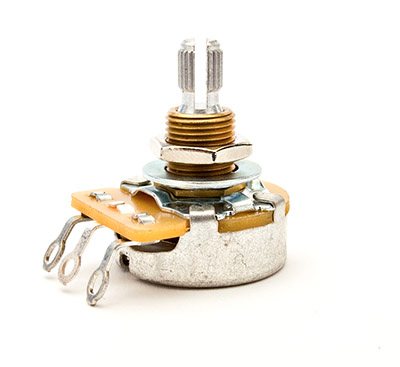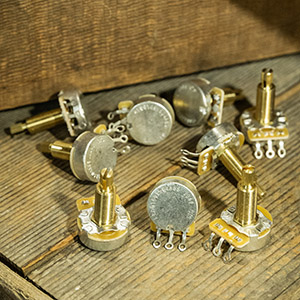
Tone Chasin’: The Skinny on Capacitors and Potentiometers (Or Caps and Pots)—Part 1
By Jason Lollar
Finding your guitar tone involves a mix of science and voodoo. This alchemy includes the role of capacitors and potentiometers, also known as caps and pots. In this article, we focus on pots, and separate fact from fiction and explain how they are typically used to give you greater tone and volume control.
Choosing the Right Control Pot

There are some standard assumptions concerning pot and cap values and their use for different pickup designs, like single coils or humbuckers. These conventions can be useful, but you don’t need to blindly follow them.
Take the pot values first. Pots with higher resistance — like 500K compared to 250K — prevent higher frequencies from bleeding through to ground more than lower ohm pots. This means a 500K pot provides a brighter overall tone than a 250K pot. Higher ohms also give you a cleaner and punchier sound on the bass strings.
Fender even went as high as a 1 Meg ohm pot, which retains so much treble it’s almost like rolling up a presence control on older fender amps. This gives you a brilliant cutting treble tone that bleeds off and sounds more normal as soon as you roll the volume down just a click or two. It does this even before it really effects the volume. A 1 meg pot can be handy when you want to cut through a mix or if your tone is muddy.
Pots for Humbuckers and Single Coils
Humbucking pickups are typically paired with 500K pots and single coils are typically paired with 250K pots. Standard humbucking pickups tend to cancel out some of the higher overtones, so 500K pots are often used to prevent extra high end from bleeding off. Single coils usually have more higher overtones, so 250K pots will bleed off a little bit of the treble, which is sometimes considered “ice picky.”
When you switch to the bridge pickup on a vintage Strat, it’s wired to bypasses a tone control pot, so you are only running one volume pot in that position. This gives you an extra bright tone in the bridge position — what I call the Ike Turner sound.
Since not everyone likes that cutting tone, a lot of Strats are modified so the bridge pickup shares the middle pickup tone pot. This pads down the treble even with the tone control set on 10.
Two Fender exceptions are the 1 Meg pots used on the Jazzmaster and with the Wide Range Humbuckers used on the Tele Custom and Deluxe. Since 500K pots are often used on P-90 single coils, the tone is thicker than Strat or Tele single coils. Of course, you can use any value pot on any pickup, it just depends on what result you want. A few guitar makers vary the pot values depending on the individual guitar and how it couples with the pickup selected. Even if a pot is stamped as a 500K, the actual ohms will vary from pot to pot. You can subtly tweak the result by measuring and swapping out one pot for another.

Pots and Audio Tapers
The other variation with pots is the taper. Pots come in audio (also called log) and linear tapers. Linear means the ohms will be 50% of the pots rated value at halfway through its travel. These are normally used to control voltage in various amplifier circuits where audio or log pots vary the volume response according to how your ear hears volume changes. Audio taper is normally used for volume and tone controls on guitars.
Audio tapers vary. On some pots, most of the volume change comes between 10 and 7. That’s great if you do a lot of volume swells, but not so good for dialing in small volume changes. Over the years, customers have told us they want an even volume roll off they can control from 10 all the way to 0. The Emerson pots we use and sell react like this.
In my next post, I’ll focus on choosing the right tone caps for your sound.
Go to Part II – Tone Chasin’: The Skinny on Capacitors and Potentiometers (Or Caps and Pots)